EVO ICL®
The Eye Institute of Utah is proud to offer a technological revolution in vision correction, EVO ICL Lens, to our patients. The EVO ICL is an Implantable Collamer® Lens that can be used to correct nearsightedness or astigmatism, freeing patients from eyeglasses or contact lenses.
Book a FREE Consultation Online 24/7
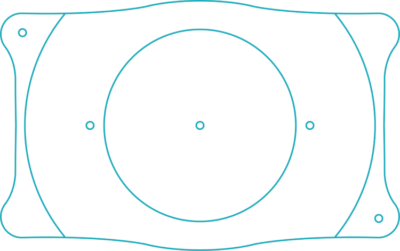
What is the EVO ICL?
The EVO ICL is an Implantable Collamer Lens, a micro-thin lens implanted in the eye to correct common vision problems. Unlike other vision correction procedures like LASIK and PRK, the EVO ICl does not require the removal of any corneal tissue, so it’s
Trusted Source
Parkhurst GD, Psolka M, Kezirian GM
Phakic intraocular lens implantation in United States military warfighters: a retrospective analysis of early clinical outcomes of the ICL
Go to Source
ideal for patients with thin corneas.
1 This implant works in harmony with the natural eye, provides UV protection and excellent night vision, and is totally removable and upgradable. Best of all, it provides sharp, clear vision, often without the need for
Trusted Source
Sanders D, Vukich JA
Comparison of implantable collamer lens (ICL) and laser-assisted in situ keratomileusis (LASIK) for low myopia
Go to Source
glasses or contacts.
2
Benefits of EVO ICL
More than 2 million EVO ICL lenses have been implanted globally. At The Eye Institute of Utah, our patients are thrilled to enjoy the many benefits of EVO ICL, which include:
-
Trusted Source Igarashi A, Kamiya K, Shimizu K, Komatsu M Visual performance after implantable collamer lens implantation and wavefront-guided laser in situ keratomileusis for high myopia Go to Source Sharp, clear vision 3
- Treats nearsightedness and astigmatism
- Comfortable, 20-30 minute procedure
- Fast recovery time
- Works in harmony with your body
- UV protection
- Removable and replaceable
-
Trusted Source Ganesh S, Brar S, Pawar A Matched population comparison of visual outcomes and patient satisfaction between 3 modalities for the correction of low to moderate myopic astigmatism Go to Source Does not cause dry eye syndrome 4
-
Trusted Source Martínez-Plaza E, López-Miguel A, López-de la Rosa A, McAlinden C, Fernández I, Maldonado MJ Effect of the EVO+ Phakic Implantable Collamer Lens on Visual Performance and Quality of Vision and Life Go to Source Excellent night vision 5
-
Trusted Source Gimbel HV, Ziémba SL Management of myopic astigmatism with phakic intraocular lens implantation Go to Source Ideal for patients with thin corneas6
Save $1,200 off EVO ICL
*$1,200 OFF discount applied to bilateral ICL surgery ($600 off per eye). May not be combined with other offers.
EVO ICL Procedure: What to Expect
Preparing for EVO ICL
There is not much patients need to do to prepare for vision correction with EVO ICL. During your consultation with your eye doctor, you will undergo a thorough eye exam and discuss why EVO ICL may be a great option for you. Your procedure will be scheduled, and a member of our team will advise you of any preoperative guidelines, as well as postoperative instructions.
The EVO ICL Procedure
The entire EVO ICL procedure takes only about 20-30 minutes and is virtually painless.
Before your EVO ICL procedure, your eye doctor will numb your eyes with anesthetic eye drops, and a device will be put in place to make it so you don’t have to worry about blinking. You will recline comfortably while a small opening is created, through which the Implantable Collamer Lens will be inserted and positioned.
Following your EVO ICL procedure, you will recover briefly at The Eye Institute of Utah before being released to be driven home by a family member or friend. You will already be noticing that your vision has improved!
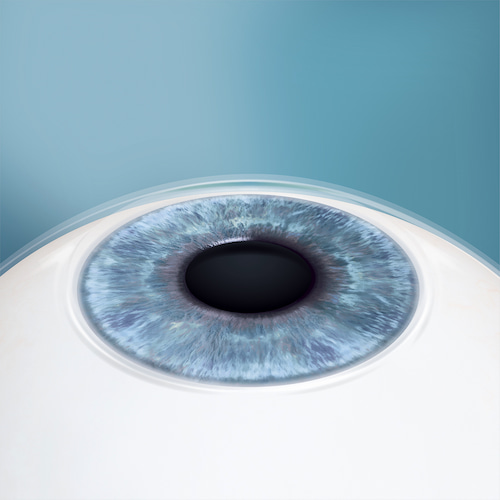
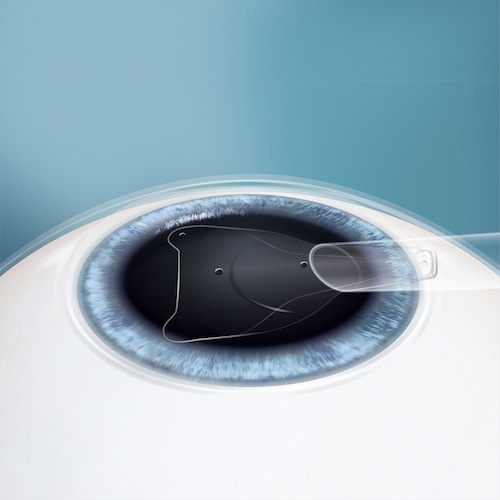
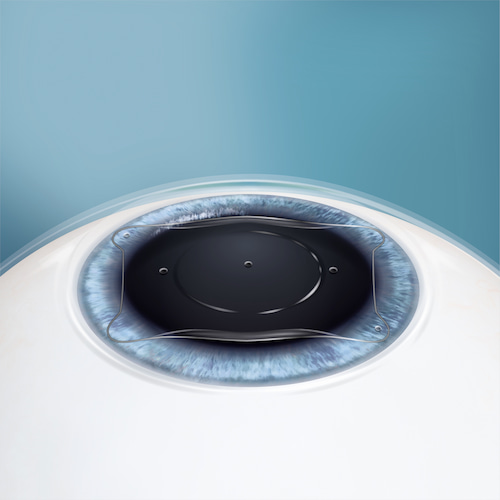
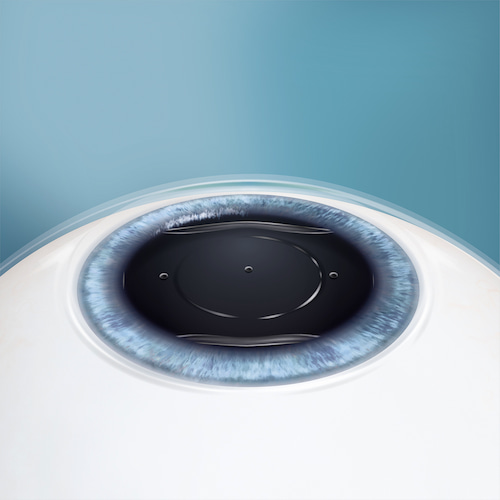
Recovery after EVO ICL
Following your EVO ICL procedure, you will notice an immediate improvement in your vision. Recovery is typically brief, and most patients are able to get back to their normal activities within a few days. The EVO ICL lens is implanted behind the iris, or the colored part of the eye. You won’t be able to feel the lens, and others won’t be able to see it.
Am I a Candidate?
The best way to determine if EVO ICL can give you the visual freedom you’ve always wanted is to schedule a consultation with an ICL surgeon at The Eye Institute of Utah.
You may be a candidate if you:
for at least one year
your need for eyeglasses or contact lenses
Did you know our own Dr. Kristin Bretz had EVO ICL® surgery?
After years of relying on glasses and contacts, she decided it was time to see the difference for herself. Now, as both a surgeon and a patient, Dr. Bretz shares a unique perspective—and a renewed appreciation for the clarity that EVO ICL provides.
EVO ICL Cost and Financing
Since EVO ICL is considered elective, this vision correction procedure is not covered by medical insurance. However, many of our patients find that the cost of EVO ICL is a superior alternative to paying for glasses, contacts, and maintenance for the rest of their lives. And who can put a price on clear vision?
At The Eye Institute of Utah, we believe that each of our patients deserves to see the world as clearly as possible. To help our patients manage expenses related to EVO ICL, we have put a number of payment and financing options into place. You can compare the cost of the EVO ICL to other vision correction procedures viewing the cost comparision chart below, or you can learn more about affordable financing here.
Comparison Chart
See how the most popular vision correction options compare.
Frequently Asked Questions About EVO ICL
Will I be able to feel the EVO ICL lens in my eye?
No, you will not feel the EVO ICL lens. You’ll only notice your clearer vision.
Will others be able to see my EVO ICL lens?
The EVO ICL lens is implanted behind the iris, or the colored part of the eye. You won’t be able to feel the lens, and others won’t be able to see it.
Will I still need reading glasses after vision correction with EVO ICL?
It is possible that you may need to wear reading glasses after implantation with EVO ICL. This is because presbyopia, or age-related near vision loss, is a natural part of the eye’s aging process that begins to affect everyone at around age 40. We offer a number of treatment options for presbyopia.
Contact The Eye Institute of Utah
If you would like to learn more about how EVO ICL can benefit your lifestyle and help you see more clearly, schedule a complimentary evaluation today at (801) 266-2283. Contact us today to take advantage of this great technology!

The team there is absolutely amazing! I had ICL surgery within the last month and felt like everyone involved truly cares. I highly recommend this facility! Thank you, Stacie, Lexie, Laurie, and Dr. Zavodni for the amazing care you have given me! I seriously can’t thank you guys enough! Five stars all the way.
R.S.
1 Parkhurst GD, Psolka M, Kezirian GM. Phakic intraocular lens implantation in United States military warfighters: a retrospective analysis of early clinical outcomes of the Visian ICL. J Refract Surg. 2011 Jul;27(7):473-81. doi: 10.3928/1081597X-20110106-03. Epub 2011 Jan 17. PMID: 21243974. Available: https://pubmed.ncbi.nlm.nih.gov/21243974/. Accessed October 25, 2021.
2 Sanders D, Vukich JA. Comparison of implantable collamer lens (ICL) and laser-assisted in situ keratomileusis (LASIK) for low myopia. Cornea. 2006 Dec;25(10):1139-46. doi: 10.1097/ICO.0b013e31802cbf3c. PMID: 17172886. Available: https://pubmed.ncbi.nlm.nih.gov/17172886/. Accessed October 25, 2021.
3 Igarashi A, Kamiya K, Shimizu K, Komatsu M. Visual performance after implantable collamer lens implantation and wavefront-guided laser in situ keratomileusis for high myopia. Am J Ophthalmol. 2009 Jul;148(1):164-70.e1. doi: 10.1016/j.ajo.2009.02.001. Epub 2009 Apr 17. PMID: 19375059. Available: https://pubmed.ncbi.nlm.nih.gov/19375059/. Accessed October 25, 2021.
4 Ganesh S, Brar S, Pawar A. Matched population comparison of visual outcomes and patient satisfaction between 3 modalities for the correction of low to moderate myopic astigmatism. Clin Ophthalmol. 2017 Jul 3;11:1253-1263. doi: 10.2147/OPTH.S127101. PMID: 28740361; PMCID: PMC5505606. Available: https://pubmed.ncbi.nlm.nih.gov/28740361/. Accessed October 25, 2021.
5 Martínez-Plaza E, López-Miguel A, López-de la Rosa A, McAlinden C, Fernández I, Maldonado MJ. Effect of the EVO+ Visian Phakic Implantable Collamer Lens on Visual Performance and Quality of Vision and Life. Am J Ophthalmol. 2021 Jun;226:117-125. doi: 10.1016/j.ajo.2021.02.005. Epub 2021 Feb 9. PMID: 33577790. Available: https://pubmed.ncbi.nlm.nih.gov/33577790/. Accessed October 25, 2021.
6 Gimbel HV, Ziémba SL. Management of myopic astigmatism with phakic intraocular lens implantation. J Cataract Refract Surg. 2002 May;28(5):883-6. doi: 10.1016/s0886-3350(01)01098-7. PMID: 11978472. Available: https://pubmed.ncbi.nlm.nih.gov/11978472/. Accessed October 25, 2021.
Page Updated:
The Eye Institute of Utah Doctors have either authored or reviewed and approved this content.
